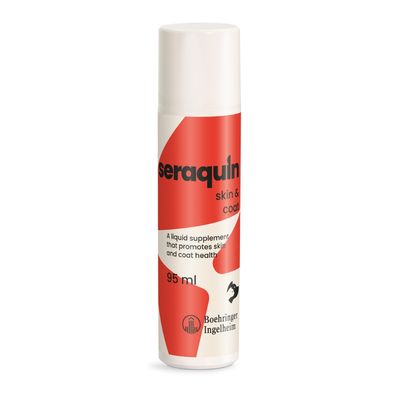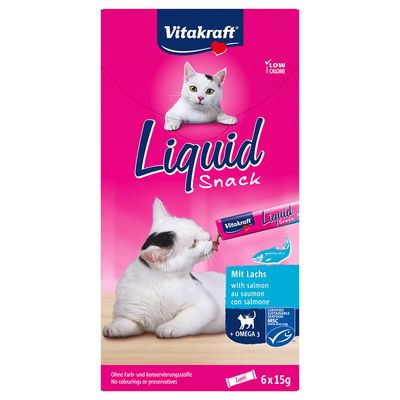Cat Skin and Coat Supplements
Veterinarian Dr. med. vet. Franziska G. explains: Cat Skin and Coat Supplements

"Vitamins are essential substances that your cat cannot produce themselves. As vitamins are involved in important metabolic processes and can have an immune-boosting function, they need to be present in your cat's diet. Some vitamins also have an important influence on skin and coat health. If these nutrients are missing and your cat becomes deficient, they may experience skin changes, a dull coat, and even hair loss.
High-quality cat skin and coat supplements provide these vital nutrients to support overall well-being. For example, vitamin B7 (biotin) is necessary for keratin formation. This is the most important component of hair, which is why biotin ensures a healthy coat. Vitamin E (tocopherol), on the other hand, acts as an antioxidant that protects the cells from free radicals and thus also strengthens the skin barrier. Vitamin A also controls the skin's sebum production, which protects it from drying out. Other vitamins that are important for the skin are B2 (riboflavin), B6 (pyridoxine) and B12 (cobalamin), as they support the metabolism. Adding a skin and coat supplement for cats that contains these vitamins can help maintain a glossy coat and healthy skin."
This content is a translation of the original text published on zooplus.de, created by Veterinarian Dr. med. vet. Franziska G., in collaboration with our editorial team. The information provided is for general guidance only and is not a substitute for professional veterinary advice, diagnosis or treatment. Always consult your vet if you have any concerns about your pet’s health or wellbeing.
Veterinarian Dr. med. vet. Franziska G. explains: Cat Skin and Coat Supplements

"Vitamins are essential substances that your cat cannot produce themselves. As vitamins are involved in important metabolic processes and can have an immune-boosting function, they need to be present in your cat's diet. Some vitamins also have an important influence on skin and coat health. If these nutrients are missing and your cat becomes deficient, they may experience skin changes, a dull coat, and even hair loss.
High-quality cat skin and coat supplements provide these vital nutrients to support overall well-being. For example, vitamin B7 (biotin) is necessary for keratin formation. This is the most important component of hair, which is why biotin ensures a healthy coat. Vitamin E (tocopherol), on the other hand, acts as an antioxidant that protects the cells from free radicals and thus also strengthens the skin barrier. Vitamin A also controls the skin's sebum production, which protects it from drying out. Other vitamins that are important for the skin are B2 (riboflavin), B6 (pyridoxine) and B12 (cobalamin), as they support the metabolism. Adding a skin and coat supplement for cats that contains these vitamins can help maintain a glossy coat and healthy skin."
This content is a translation of the original text published on zooplus.de, created by Veterinarian Dr. med. vet. Franziska G., in collaboration with our editorial team. The information provided is for general guidance only and is not a substitute for professional veterinary advice, diagnosis or treatment. Always consult your vet if you have any concerns about your pet’s health or wellbeing.
What to feed your cat for a shiny coat?
A balanced diet that combines high-quality proteins, essential fatty acids and vitamins is particularly important for a shiny coat in cats. The following products can help ensure your cat gets enough nutrients for healthy skin:
- Special dietetic food such as cat food for skin health
- Special supplementary food for skin and coat
- Cat food with a high proportion of fish
- Cat food with a high meat content
What to feed your cat for a shiny coat?
A balanced diet that combines high-quality proteins, essential fatty acids and vitamins is particularly important for a shiny coat in cats. The following products can help ensure your cat gets enough nutrients for healthy skin:
- Special dietetic food such as cat food for skin health
- Special supplementary food for skin and coat
- Cat food with a high proportion of fish
- Cat food with a high meat content
What is cat food for a shiny coat?
Cat food for a shiny coat is cat food that has been specially developed for healthy skin and coat. It is generally rich in high-quality protein, essential fatty acids (e.g. omega-3 and omega-6 fatty acids in salmon oil for cats) and vitamins. The aim of cat food for a shiny coat is to promote hair growth and strengthen the skin barrier through balanced nutritional skin and coat supplements. Vitamin-rich ingredients are often used, such as liver or chicken.
What is cat food for a shiny coat?
Cat food for a shiny coat is cat food that has been specially developed for healthy skin and coat. It is generally rich in high-quality protein, essential fatty acids (e.g. omega-3 and omega-6 fatty acids in salmon oil for cats) and vitamins. The aim of cat food for a shiny coat is to promote hair growth and strengthen the skin barrier through balanced nutritional skin and coat supplements. Vitamin-rich ingredients are often used, such as liver or chicken.
What are the signs of a vitamin deficiency in cats?
The symptoms your cat will show if it has a vitamin deficiency depend on which vitamin they are lacking. However, the following signs are particularly common:
- Dull and brittle coat or even hair loss (alopecia)
- Irritated, dry or scaly skin
- Tiredness and reluctance to move
- Immunodeficiency (frequently occurring infections)
- Loss of appetite and weight loss
- Digestive problems in cats
What are the signs of a vitamin deficiency in cats?
The symptoms your cat will show if it has a vitamin deficiency depend on which vitamin they are lacking. However, the following signs are particularly common:
- Dull and brittle coat or even hair loss (alopecia)
- Irritated, dry or scaly skin
- Tiredness and reluctance to move
- Immunodeficiency (frequently occurring infections)
- Loss of appetite and weight loss
- Digestive problems in cats
Which vitamins do cats need for a shiny coat?
One of the most recommended skin and coat supplements for cats are vitamins. You can give your cat the following vitamins to support certain bodily functions:
| Vitamins- | Vitamin A |
|---|---|
| Target area- | Eyes (vision), skin and coat, immune system |
| Vitamins- | Vitamin B complex |
| Target area- | Skin and coat, nervous system, metabolism |
| Vitamins- | Vitamin C |
| Target area- | Immune system |
| Vitamins- | Vitamin D |
| Target area- | Bones, teeth |
| Vitamins- | Vitamin E |
| Target area- | Skin and coat, immune system (antioxidant) |
| Vitamins- | Vitamin K |
| Target area- | Blood clot formation, bones |
Vitamins- | Target area- |
|---|---|
Vitamin A | Eyes (vision), skin and coat, immune system |
Vitamin B complex | Skin and coat, nervous system, metabolism |
Vitamin C | Immune system |
Vitamin D | Bones, teeth |
Vitamin E | Skin and coat, immune system (antioxidant) |
Vitamin K | Blood clot formation, bones |
When supplementing vitamins, however, you should bear in mind that you must always adjust the amount to your cat's diet. This is because it is possible to consume too much of some vitamins (e.g. vitamin A), which can lead to health problems. Talk to your vet about whether your cat needs a supplement and if so, which vitamins are suitable.
Which vitamins do cats need for a shiny coat?
One of the most recommended skin and coat supplements for cats are vitamins. You can give your cat the following vitamins to support certain bodily functions:
| Vitamins- | Vitamin A |
|---|---|
| Target area- | Eyes (vision), skin and coat, immune system |
| Vitamins- | Vitamin B complex |
| Target area- | Skin and coat, nervous system, metabolism |
| Vitamins- | Vitamin C |
| Target area- | Immune system |
| Vitamins- | Vitamin D |
| Target area- | Bones, teeth |
| Vitamins- | Vitamin E |
| Target area- | Skin and coat, immune system (antioxidant) |
| Vitamins- | Vitamin K |
| Target area- | Blood clot formation, bones |
Vitamins- | Target area- |
|---|---|
Vitamin A | Eyes (vision), skin and coat, immune system |
Vitamin B complex | Skin and coat, nervous system, metabolism |
Vitamin C | Immune system |
Vitamin D | Bones, teeth |
Vitamin E | Skin and coat, immune system (antioxidant) |
Vitamin K | Blood clot formation, bones |
When supplementing vitamins, however, you should bear in mind that you must always adjust the amount to your cat's diet. This is because it is possible to consume too much of some vitamins (e.g. vitamin A), which can lead to health problems. Talk to your vet about whether your cat needs a supplement and if so, which vitamins are suitable.
What is good for cats' fur?
To ensure your cat has a healthy and shiny coat, you should provide a balanced diet and regular grooming if your cat is unable to groom itself. In any case, make sure that your cat gets all the important vitamins for fur and fatty acids it needs for healthy skin.
What is good for cats' fur?
To ensure your cat has a healthy and shiny coat, you should provide a balanced diet and regular grooming if your cat is unable to groom itself. In any case, make sure that your cat gets all the important vitamins for fur and fatty acids it needs for healthy skin.
Which vitamin B do cats need?
Vitamins B2, B5, B6, B7 and B12 are particularly important for your cat, as they have a strong influence on skin health and metabolism.
Which vitamin B do cats need?
Vitamins B2, B5, B6, B7 and B12 are particularly important for your cat, as they have a strong influence on skin health and metabolism.
Which cat food ingredients contain a lot of vitamin B?
Natural sources of B vitamins are animal ingredients such as liver and kidneys, chicken, fish and eggs.
Which cat food ingredients contain a lot of vitamin B?
Natural sources of B vitamins are animal ingredients such as liver and kidneys, chicken, fish and eggs.












